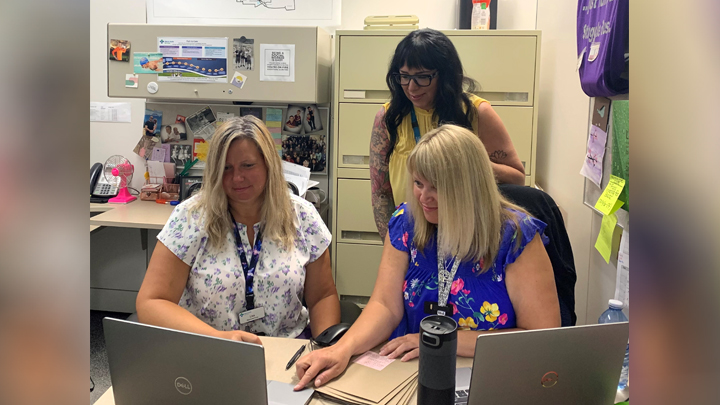
October 3, 2023

Increased collaboration is helping the Central Intake team find the right spot for each patient sooner. Team members include, from left, Lisa Elford-Milley, Kris Wielinga and Sharla Piecowye. Photo supplied.
Story by Gayleen Froese
RED DEER — Patients in need of rehabilitation or restorative care sometimes find it difficult to navigate through their discomfort, change and uncertainty. Alberta Health Services’ (AHS) Allied Health team in Central Zone recognizes that helping them doesn’t just mean the therapy itself but ensuring they are connected to the right care in the first place.
In response, the Rehabilitation and Restorative Care Intake Program launched last October to create a simpler, more standardized and more effective intake process for five intensive rehabilitation programs throughout central Alberta.
Sharla Piecowye, a social worker with the intake program, says patients and care providers struggled at times with the previous system.
“Each program had different forms, criteria and processes — and there was a lot of paperwork that fell to the nurses and therapists who needed that time for frontline care with patients,” she says.
“Patients were also seeing delays in getting care or feeling that their care program wasn’t a good fit. Half the patients we surveyed said they didn’t know what to expect from the programs before they entered them. We wanted to create something better.”
Working with program staff, the Rehabilitation and Restorative Care Intake Team created a standardized referral form and clearly spelled out the eligibility and admission criteria for all five programs. The team also developed an intensive rehabilitation brochure and a set of post-intake program information sheets to help patients know what to expect. They also made the process more collaborative — intake team members now connect directly with patients to ensure a better patient-to-program match.
More than 650 referrals have been received since the program began. In the first three months of centralized intake, the percentage of referrals accepted by programs increased to 86 per cent from 75 per cent . These early numbers reflect how the new process is finding a better fit for patients and gaining the confidence of care providers and programs.
Eighty per cent of stroke patients now have their referrals reviewed within 24 hours of Intake receiving them, and the average time patients spend on waiting for a bed in their identified program after intake approval is less than three days. These timelines make a positive difference to outcomes.
J.P. Lanigan connected with a program at Red Deer Regional Health Centre through Rehabilitation and Restorative Care Intake — and appreciates finding out what to expect before the program began. “They told me about all the different teams and everyone who would be in to see me, so I was informed. It went really well.”
On average, a patient spends just over a month in Intensive Rehabilitation, after which nearly 80 per cent can return home. It’s a positive result that comes, in part, from the new intake team getting their process off to a good start.
“The numbers show that what we’re doing is working,” adds Piecowye. “And it makes sense. We wanted to create an easier process that had us directly connecting with patients as individuals, I think we’ve done that.”